Resources for Neurodiversity: A Guide to Funding and Grant Options
Resources for Neurodiversity: A Guide to Funding and Grant Options
Brain in Hand
In the UK, a wide variety of resources for neurodiversity are available, including grants and benefits that can fund support for individuals who are neurodivergent, disabled, or have a mental health condition. Many people are unaware of the neurodiversity grants and other funding options they could be eligible for, even without a formal diagnosis.
The Equality Act 2010 provides a broad, informative definition of a ‘disability’ that can help you to determine if you may qualify for support. Each funding option will have differing eligibility criteria and its own application process.
We’ve summarised key funding options to help you get an overview. While we cannot apply for funding for you, we hope our guide offers valuable insights into neurodiversity resources for adults, and serves as a useful starting point.
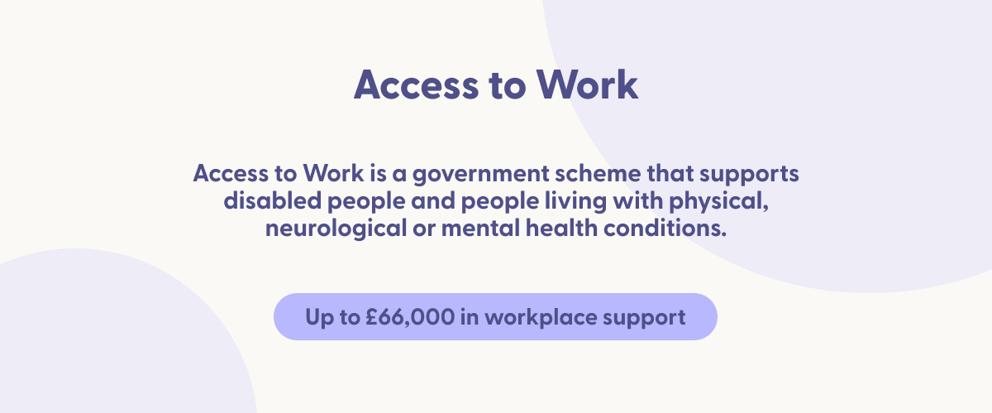
Access to Work (AtW): Grants for neurodiversity support in the workplace
Access to Work (AtW) can fund workplace support for those with physical, neurological, or mental health conditions or disabilities. This government grant is designed to help individuals get or stay in work with the right support for their needs. Each year, the Access to Work scheme can award up to £66,000 in workplace support.
This support can include assistive technology, equipment, and software. Access to Work also offers travel support, professional supporters, and a dedicated mental health support service. The kind of support you receive will depend on your exact needs and will be determined during the application process.
The eligibility criteria for Access to Work is broad and may not require a formal diagnosis. The scheme is available to those employed, self-employed, or starting work (subject to eligibility criteria). If you feel that your condition impacts you day-to-day and you need support to do your job effectively, it can be useful to consider Access to Work.
If your job is in England, Scotland, or Wales, learn more about Access to Work here. For Northern Ireland, find information about Access to Work (NI) here.
Explore our Access to Work resources:
- Your Ultimate Guide to Access to Work: A comprehensive overview
- Free on-demand webinar: Demystify Access to Work with expert advice
- Real stories: How Access to Work and Brain in Hand help me thrive at work
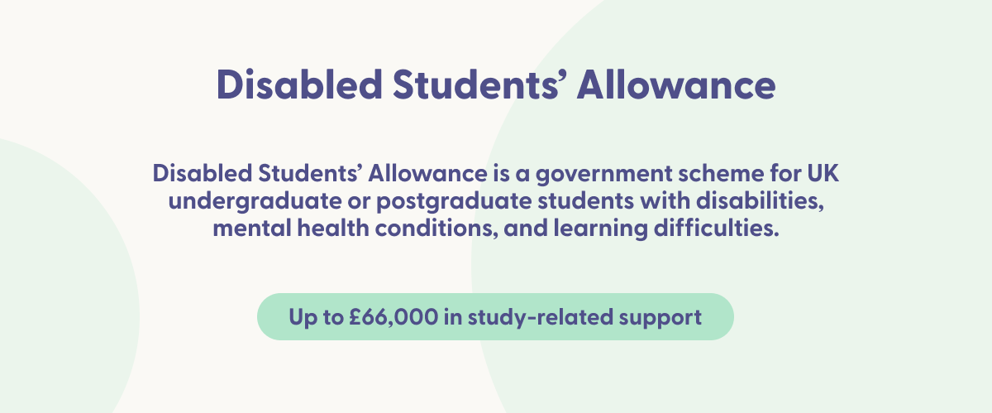
Disabled Students’ Allowance (DSA): Neurodiversity grants for higher education support
Disabled Students’ Allowance (DSA) is a government grant scheme for UK undergraduate and postgraduate students on full or part-time courses. This scheme can cover up to £26,000 in study-related costs for those who have a disability, long-term impairment or health condition, learning difficulty, or mental health condition.
Similar to AtW, this grant covers a wide range of support, including assistive technology and software, professional helpers, and travel costs. DSA makes it possible for students to access a personalised package of support and neurodiversity resources throughout their time in higher education. This grant is not based on household income and can be claimed in addition to student finance or on its own.
59% of students who received DSA said they wouldn’t have felt as confident about passing their course without the extra support, according to the Department of Education (January, 2019). This highlights the importance of DSA for breaking down academic barriers for students and ensuring resources for neurodiversity are available.
Learn more about Disabled Students’ Allowance and how to apply here.
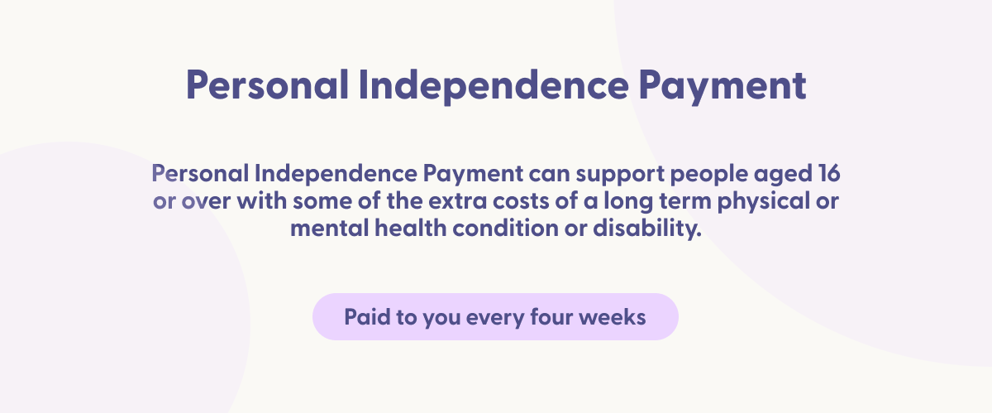
Personal Independence Payment (PIP)
Personal Independence Payment (formerly Disabled Living Allowance) can help people aged 16 or over with some of the extra costs of a long term physical or mental health condition or disability. You can use this funding to pay for services or technology that can support you.
If your application is successful, this benefit will be paid directly to you every 4 weeks. The exact amount you receive will be determined upon assessment. PIP is divided into two parts, one for daily living and another for mobility needs. These two areas will determine how much you are paid, and the exact rate will depend on whether you are awarded a standard or enhanced rate.
On average, you could be paid between £70 to £100 for daily living each week. For the mobility part, you could be paid between £28 to £75 per week. If you receive PIP, you may also be eligible for additional support schemes, which can be useful resources for neurodiversity.
For example, those who receive a higher mobility rate might be eligible for a Motability Scheme vehicle. If you need a carer and receive PIP, your carer might be eligible for Carer’s Allowance payments. These are just a few of the additional support options that PIP could open the doors to.
If you’re not eligible for AtW or DSA, this can be a helpful option to consider, allowing you to access funding and pay for support that works for you. You can also apply for PIP if you are working, studying, or receiving other benefits.
If you’re in England, Wales, or Northern Ireland learn more about Personal Independence Payment and apply here.
If you live in Scotland, you can apply for Adult Disability Payment instead. If you need support, contact your local citizens advice to learn more about PIP as a benefit and get help with your application.
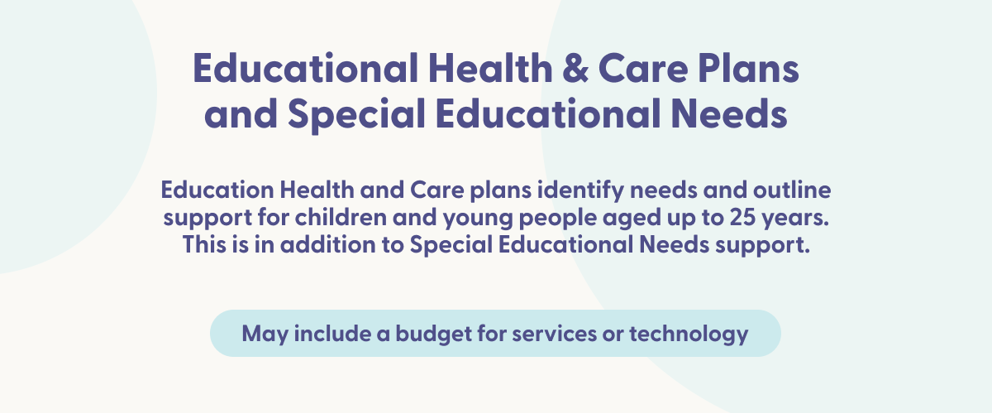
Educational Health & Care (EHC) Plans and Special Educational Needs (SEN)
Children and young people with special educational needs or disabilities can receive additional support for their education, health, and social needs until the age of 25. Special Educational Needs (SEN) support can be provided by school or college, however, an Educational Health & Care (EHC) plan can be put in place for more complex needs.
This plan will identify the education, health, and social needs of a young person, and set out additional support to meet their needs. Sometimes this can include a personal budget for services or technology.
Contact your local authority for information, or learn more about SEN support and EHC plans here.
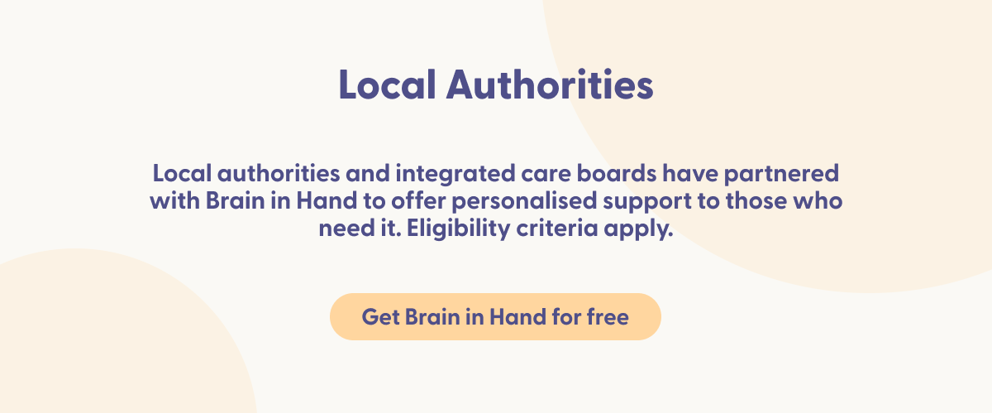
Local authorities
Your local integrated care board might be able to offer you support in the form of services, technologies, or resources for neurodiversity. This will depend on what they can offer and their eligibility criteria. You can find more about your local integrated care board here.
Other sources
If you are not eligible for a national funding scheme, you may still be able to ask for support from your school, college, employer or any Local Authority, Social Care, NHS or Mental Health services that you are being supported by. There may also be charities local to you that offer grants or support to find funding. You may be able to get support identifying local charities from Citizen’s Advice or Disability Grants. For example, Family Fund offer a range of grants.
About Brain in Hand
Brain in Hand is a personalised support system that combines the power of human and digital support. Our system is designed to help people reduce anxiety, manage overwhelm, and gain motivation. We’ve supported neurodivergent adults and those with anxiety-based mental health conditions to thrive in their work, studies, and personal lives.
How to fund Brain in Hand
We’ve explored a range of funding options above that can also help you fund a Brain in Hand licence. For personalised suggestions on the best funding options for you, check out our Funding Finder. We’ll email you a summary of the funding options that you might be eligible for based on the information you share with us.
Summary
Here’s a quick overview of all the neurodiversity grants and funding options we covered:
- Access to Work funds up to £66,000 in workplace support for those who are employed, self-employed, or starting work.
- Disabled Students’ Allowance covers £26,000 in study-related costs for UK undergraduate and postgraduate students studying on part or full-time courses.
- Personal Independence Payment offers financial support to those aged 16 and over which is paid every four weeks and could entitle you to other support schemes.
- Educational Health & Care (EHC) Plans identify the education, health, and social needs up to the age of 25, and set out additional support to meet these needs.
- Local authorities may offer support in the form or services of technologies, like Brain in Hand.